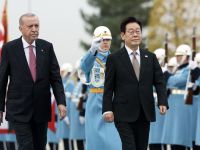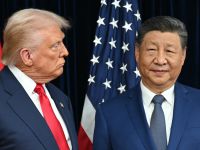Tentative hopes of reviving the Middle East peace process were focused on Spain on Saturday after Israeli Foreign Minister Shimon Peres and Palestinian leader Yasser Arafat met briefly on the sidelines of a Euro-Mediterranean forum.
The dovish Peres, who lunched with Arafat in Majorca on Friday, had begun the day by commenting in a Jewish newspaper that Israel must immediately abandon several Jewish settlements in the Gaza Strip.
"Yes, I am in favor, and not in order to please the Palestinians, but because there are particular settlements exposed to gunfire, which have no future," Peres declared.
Peres also called for the resumption of political negotiations despite the ongoing 13-month Palestinian uprising.
The meeting in Spain was the first between Peres and Arafat since Sept. 26, when they agreed on a tentative ceasefire between Israelis and Palestinians in a bid to get the Middle East peace process rolling again.
The ceasefire collapsed almost immediately and the violence between the two sides has continued unabated.
Friday was a relatively quiet day on the ground, but a Palestinian gunman killed an Israeli in the West Bank, shortly after the Peres-Arafat meeting.
Israeli television reported that gunmen had killed an Israeli but did not identify the victim or provide any other details.
After the shooting near Ramallah an Israeli tank and about a dozen armored vehicles made a brief incursion into the Palestinian village of Silwad where about 20 people were arrested, Palestinian sources later told AFP.
The latest death brought the toll of 13 months of the Palestinian uprising, or intifada, to 947, including 741 Palestinians and 184 Israelis.
The shooting was the only major incident to blight one of the calmest days in more than a month in the Occupied Territories, where the intifada against the 34-year Israeli occupation has raged for over a year.
It came after Peres and Arafat, who shared the 1994 Nobel peace prize, met briefly on the terrace of a hotel on the Spanish island of Majorca.
The two were seen together, in the hotel on the island of Majorca where the conference is being held, with Egyptian President Hosni Mubarak and Spanish Prime Minister Jose Maria Aznar in attendance. The four leaders had lunch together.
During his opening speech to the conference Mubarak criticised Israel, saying it was pursuing provocative politics and that it was resorting to violence.
"The continuation of provocative politics on the part of the Israeli government, its use of violence, blockades and closing of borders in an attempt to oppress the Palestinian people... leads to a vicious circle of indefinite violence and counter violence," he said.
Both Peres and Arafat indicated they were prepared to meet on the sidelines of the forum in Formentor, although it was unclear whether they would hold substantive talks or negotiations.
However, there were signs that the relative quiet would not last long, with no viable peace process in sight despite the talks British Prime Minister Tony Blair held on Thursday with the leaders of both sides on Thursday.
Israel hailed Blair's visit, while the Palestinians lamented his failure to lay out a bold initiative to establish a Palestinian state.
Meanwhile, a senior Israel defense official reasserted the Jewish state's right, in defiance of international criticism, to kill Palestinian militants it suspects of planning attacks.
And Israeli tanks also continue to partially re-occupy five Palestinian cities they invaded after a cabinet minister was gunned down in Jerusalem on Oct. 17.
"We will continue these operations of interception because they permit us to avoid bloody attacks on Israel," Deputy Defence Minister Dalia Rabin Pelossof told army radio in the aftermath of a string of assassinations of Palestinians this week.
Pelossof applauded Thursday's killing in a helicopter raid of two members of the Islamic resistance group Hamas near the West Bank town of Tulkarem, whom Israel accused of plotting a "terror" attack.
A senior official in the United States, which has been trying to calm the region to prevent further Arab and Muslim anger amid its war in Afghanistan, also charged that the Palestinian uprising had become a "process of calculated terror."
"The intifada, whatever its origin, has become an ongoing process of calculated terror and escalation, reciprocated by actions which all too often by Israel have proved inflamatory and provocative," said David Satterfield, the deputy assistant secretary of state for Near East affairs -- AFP
© 2001 Al Bawaba (www.albawaba.com)







